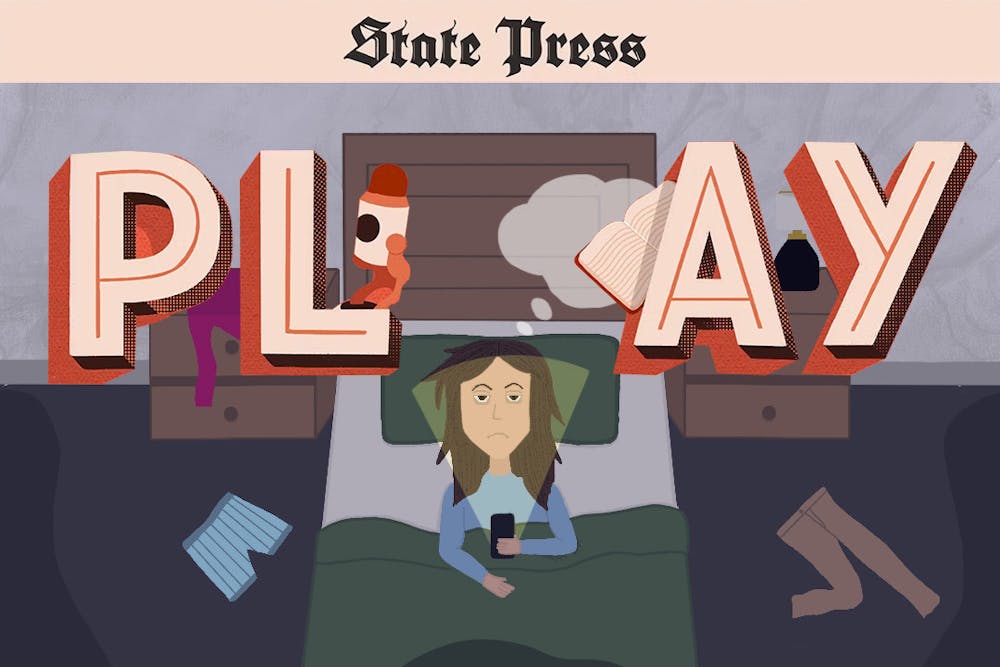State Press podcast transcripts are produced by a third-party transcription service and may contain errors. The official record for State Press podcasts is the audio. Please listen to the audio as this transcript may only contain summary forms of the given episode.
Ava Peguese:
Welcome back to the podcast! This week we discussed the rise of convenience technology and its pitfalls with a fellow reporter.
Connor Greenwall:
Also a spotlight on the Devils 4 Devils and their student mental health resources.
Ava Peguese:
I’m Ava Peguese.
Connor Greenwall:
I’m Connor Greenwall, and this is State Press Play.
Ava Peguese:
Hi everyone! Today I’m here with Anushvi Arora an international student, one of our science and technology reporters here at the State Press. She is working on an article about the topic of convenience technology, and it piqued my interest. Lets face it folks, we’re all addicted to our phones in one way or another. And don’t say not me. Because yes you too. With endless information constantly at our fingertips, who wouldn’t be? My question for you listeners is where does it end? Is there an endpoint in signt for how convenient things can be? The truth is that humans are greedy and it won’t ever be enough. Anushvi, how do you distinguish convenience tech from useful innovations?
Anushvi Arora:
Convenience tech is basically something that makes like tasks easier for us. For example, there's new phones coming, new headphones coming. For example, electronic vegetable cutter. We don't really need it. We can just use a knife to cut our vegetables. We don't really need it. And that is basically one of the professors mentioned that is actually de skilling us. We don't have the basic human capabilities. Half of the people that I'm literally room with don't even know how to cut vegetables anymore because we have a vegetable cutter. So that is what convenience tech is. For example, we need our laptops for our assignments. We need our phones. We need our headphones, obviously. So that is useful tech, that is something that people use on a daily basis, and convenience tech is something which makes our tasks easier, which can be used. It's definitely beneficial for us, and makes, like, our tasks way more easier. But again, it's not a necessity, and people buy it, and it's just de skilling us. And I think that is something that needs to be shortened down, and we don't really need to buy it so much. So it has short term benefits. But honestly yeah, just the example was the vegetable cutter. So we don't really need it. That is basically the difference between convenience tech and useful tech.
Ava Peguese:
We definitely live in a world where you can make absolutely anything faster and easier. How do you think that the increase of convenience has effected our relationship with time and productivity?
Anushvi Arora:
I would say, has definitely decreased productivity. People are not at all productive anymore. When they wake up, they have to make breakfast. They use the technology that they have. They just order. It's again, decreasing our productivity we don't work on ourselves. And when it comes to time management, convenience is definitely helping our time management, I feel like, because it makes our tasks easier, so we don't really have to work on a specific task for a long period of time. So it's definitely making it easier, but again, it's de skilling people, and it's not really teaching them anything anymore. So when it comes to convenience tech, it is definitely useful, since we use it on a daily basis. But time management is definitely helping with time management, but not helping with like productivity, and not teaching people anything, it's de skilling us, and we're losing our basic human capacities. For example, one of the professors that I interviewed was named Professor Jameson Wetmore. He works, he's a professor at the School of future and innovation. He gave me an example from the story called the time the machine stops, and what that story is basically about, everyone lives in a world, and a girl who's working in the world, she drops a book, and she doesn't even know how to bend down and pick that book up, because in that world, the floor literally comes up and hands her the book back. So that's what happens when you're so dependent on technology and gadgets on a daily basis that you don't even know how to bend down and pick up some pick up something from the floor. So I feel like that is the future that we're turning towards, and that is something that people need to understand, that we need to attain these basic human capacity and instead of depending so much on these gadgets that are coming out every day. So basically, we just need to come out of this cycle of buying new products every single day and actually start working on our addiction.
Ava Peguese:
Besides the electric vegetable cutter, was there a specific product that you saw that kind of inspired you to write about the issue?
Anushvi Arora:
I mean, it's just not about vegetable cutter. It's just about any basic gadget that we use nowadays, for example, even if we're doing an assignment, half of the people use AI to use to do their assignments. Like half of the people, they have plagiarized assignments, they use AI, they use websites like claude chat GPT, to do their assignments. It's not just about vegetable color. It's just about how much people are addicted to the technology, how tasks these technology are making it easier. You know what I mean. So it was just basically about, for example, there's a new phone that going on, iPhone 16. People who have the iPhone 15 pro Max still want the iPhone 16, even though their iPhone 15 pro Max is working perfectly fine. It's just about being in that loop and being in that cycle. It's just the market pressure to buy the new shiny thing that comes out. For example, it's easier for the person to obviously get the new get a new phone instead of actually getting their previous phone repaired. But again, that's going to produce a huge amount of electronic waste. So people need to understand that they need to come out of the cycle. They can just take these like small steps. For example, if we're in universities, they can educate people because they're so addicted to it that they don't even know the harmful causes that these technology caused. For example, me, before riding this, didn't even know that they have there's so much e waste that is being generated. For example, if I get a new phone and if I throw my phone away, that's environmental harm. There's so much that is being generated into the environment that we don't know as students, I feel like universities and our students can lead by example and start initiatives to actually educate other people about the harmful effects that these things have. And that is something that like encouraged me to write this article.
To hear more from Anushvi, please tune in to State Press Play.
Connor Greenwall:
I'm here with Antonio Folcarelli, the co-president of Devils 4 Devils, a student outreach organization here ASU that focuses on mental health. He is a transfer student from Scottsdale Community College studying English creative writing. Antonio, could you tell me about Devils 4 Devils and your mission?
Antonio Folcarelli:
Yeah, so Devils 4 Devils is basically a club, kind of attached the counseling department where we kind of teach students how to be empathetic toward one another, and kind of help one another out during tough times, also coping skills, you know, when especially a stressful semester comes along and our mission is essentially to just create a safer and more connected community on campus.
Connor Greenwall:
And how did you get involved with the Devils 4 Devils?
Antonio Folcarelli:
I think a year ago, I attended Devils 4 Devils meetings. I always attended meetings for clubs, and actually I got into student government when I was at Scottsdale Community College, and I was really missing that component. You know, after I transferred to ASU, there's really not much that I connected with, that I could feel involved with. Then I attended Devils 4 Devils meetings, and that is when I could really see how I could make a difference and not just be someone who was, you know, listening in on the meeting and the leadership, you know, the the former leaders, connected with me and saw potential in me, and they encouraged me to become a leader. So that's where I'm at now.
Connor Greenwall:
And you had mentioned that Devils 4 Devils works directly with the counseling department, which seems to be a bit different than most clubs here at ASU. So what's that relationship like working directly with a vital part of the ASU faculty?
Antonio Folcarelli:
Yeah. So it's really unique. We have multiple advisors, not just the advisor that facilitates the club, because you needed a certain number of advisors to make a club happen, you need a certain number of officers. But we also have direct access to faculty from the counseling department who help us figure out what training to put in, both for ourselves and for members, so we can offer more members. We have certain resources, such as knowing how the counseling department works, so that if you were to refer a friend to get help, you would know exactly the ins and outs of that in addition to being an officer of the club. So we're kind of almost like being a student worker. And there are student worker positions actually that help with us. There are student workers who are like outreach specialists, and they are learning how to be outreach specialists while also facilitating the club and facilitating us as officers learning how to be our specialist ourselves, you know as non workers.
To hear more from Antonio, please tune in to State Press Play.
Ava Peguese:
And that’s all for this week’s State Press Play. I’m Ava Peguese.
Connor Greenwall:
And I’m Connor Greenwall. State Press Play is produced by our podcast desk editor, Kylie Saba. Our original music is by Ellie Willard and Jake LaRoux.
Ava Peguese:
Special thanks to our managing team, Morgan Kubasko and Matthew Marengo.
Connor Greenwall:
You can check out all these stories and more on statepress.com. See you next week




